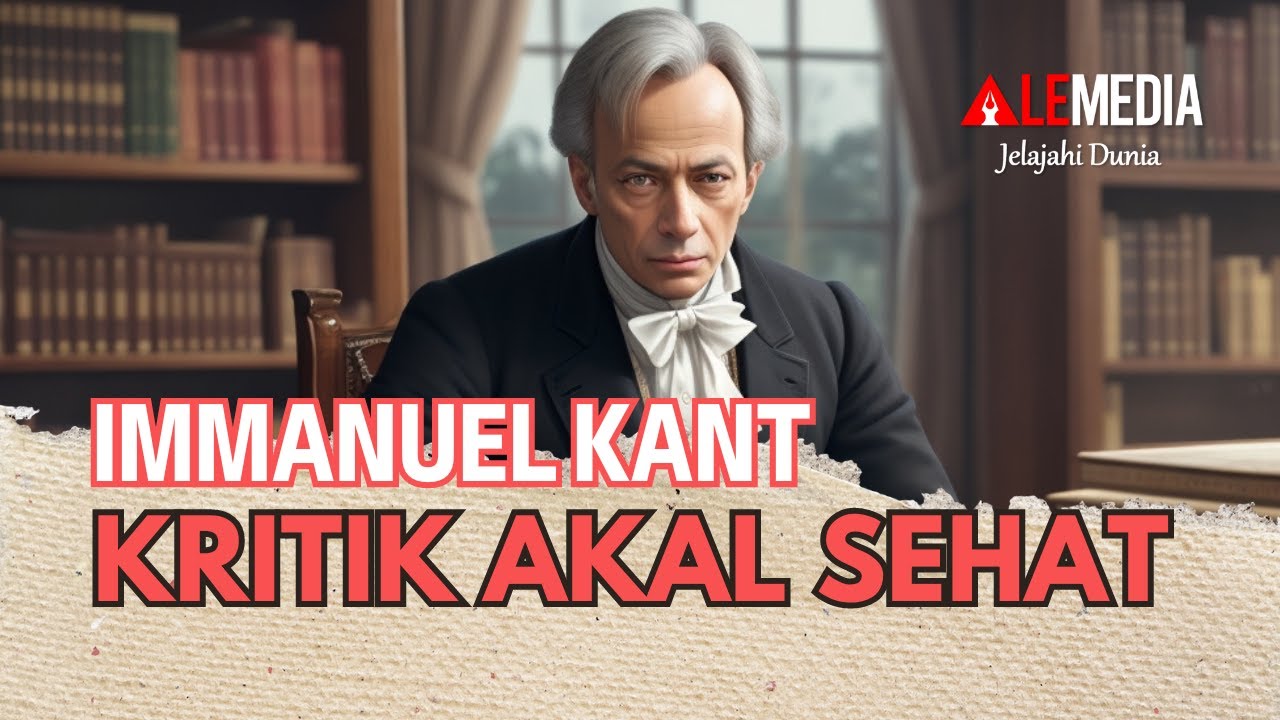PHILOSOPHY: Immanuel Kant
Summary
TLDRImmanuel Kant, born in 1724 in Königsberg, was a philosopher who sought to establish a secular foundation for morality through reason, independent of traditional religious beliefs. Despite his modest upbringing, Kant's influential ideas, such as the Categorical Imperative, aimed to foster ethical behavior and social cohesion. His work extended to politics and aesthetics, emphasizing the importance of beauty and art in promoting rationality and ethical conduct, ultimately contributing to a secular, rational approach to human goodness.
Takeaways
- 📚 Immanuel Kant was a philosopher focused on the ethical dimensions of human nature and secularism.
- 🏙️ He was born in Königsberg, Prussia, which is now Kaliningrad, Russia.
- 💼 Kant lived modestly and did not achieve financial prosperity until his fifties when he became a professor.
- 🛐 Despite not adhering to conventional religious beliefs, Kant recognized the social utility of religion.
- 🔍 Kant's physical appearance was not impressive, but he was sociable and enjoyed social gatherings.
- 🍽️ He had specific rules for conversation during his dinner parties, promoting intellectual discourse and good spirits.
- 📜 Kant's life's work was to establish reason as the authority for ethical behavior, replacing religious authority.
- 📝 He introduced the 'Categorical Imperative', a principle for testing the morality of actions.
- 💡 The Categorical Imperative encourages us to consider the universality of our actions and their impact on others.
- 🏛️ In politics, Kant believed in the importance of liberty and the role of government in fostering reason and freedom.
- 🎨 Kant also wrote about aesthetics, viewing beauty and art as reminders of our better selves and essential to ethical living.
- 📖 His dense and abstract writings aimed to strengthen the rational aspects of human nature against inherent weaknesses.
Q & A
Who was Immanuel Kant and what was his main philosophical focus?
-Immanuel Kant was an 18th-century philosopher born in Königsberg, Prussia (now Kaliningrad, Russia). His main philosophical focus was on how human beings could be good and kind outside the influence of traditional religions, emphasizing the role of reason in ethics and morality.
What was Kant's background and how did it influence his philosophical views?
-Kant came from a modest family with deeply religious and strict parents. Although he later did not hold conventional religious beliefs, he recognized the importance of religion in fostering social cohesion and community, which influenced his views on the need for ethical behavior.
How did Kant's personal life reflect his philosophical beliefs?
-Kant lived modestly, even after becoming a professor, and his social life was characterized by a structured approach to conversation and reflection, mirroring his philosophical emphasis on reason and ethical discourse.
What was the historical period during which Kant was writing, and how did it influence his work?
-Kant was writing during The Enlightenment, a period characterized by growing secularism and declining religious authority. This influenced his work as he sought to replace religious authority with the authority of reason.
What is the 'Categorical Imperative' and how did Kant introduce it?
-The 'Categorical Imperative' is a central concept in Kant's moral philosophy, introduced in his work 'Groundwork of the Metaphysics of Morals'. It is a principle that states one should act only in such a way that the maxim of their action could be willed as a universal law.
How does the 'Categorical Imperative' function as a moral guideline?
-The 'Categorical Imperative' functions as a moral guideline by urging individuals to consider the universality of their actions and to imagine the consequences if everyone acted in the same way, thus promoting ethical behavior.
What is the alternative formulation of the 'Categorical Imperative' that Kant proposed?
-Kant proposed an alternative formulation of the 'Categorical Imperative': 'Act in such a way that you treat humanity, whether in your own person or in the person of any other, never merely as a means to an end, but always at the same time as an end.'
How did Kant's views on freedom differ from the common libertarian perspective?
-Kant believed that freedom is not about the absence of government or the ability to do whatever one wants. Instead, he argued that we are free only when we act in accordance with our own best natures, emphasizing the role of reason over passions.
What role did Kant assign to the government in his political philosophy?
-In Kant's political philosophy, the central duty of government is to ensure liberty, but not in the libertarian sense. The government should help individuals act according to their rational selves, thus institutionalizing the best parts of human nature.
Why did Kant consider his work on beauty and art, 'The Critique of Judgment', as integral to his philosophy?
-Kant viewed his work on beauty and art as integral because he believed that art and beauty serve as reminders of our better selves and provide vivid illustrations and symbols of good behavior, which is crucial for maintaining ethical conduct.
What was Kant's ultimate goal in his philosophical project, and how did he aim to achieve it?
-Kant's ultimate goal was to develop a secular, rational approach to strengthen the better, more reasonable parts of human nature against inbuilt weaknesses and selfishness. He aimed to achieve this by promoting the authority of reason in ethics, politics, and aesthetics.
Outlines

This section is available to paid users only. Please upgrade to access this part.
Upgrade NowMindmap

This section is available to paid users only. Please upgrade to access this part.
Upgrade NowKeywords

This section is available to paid users only. Please upgrade to access this part.
Upgrade NowHighlights

This section is available to paid users only. Please upgrade to access this part.
Upgrade NowTranscripts

This section is available to paid users only. Please upgrade to access this part.
Upgrade NowBrowse More Related Video
5.0 / 5 (0 votes)





